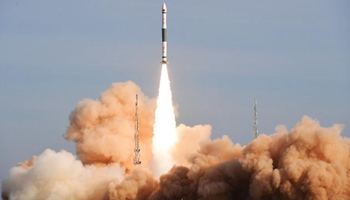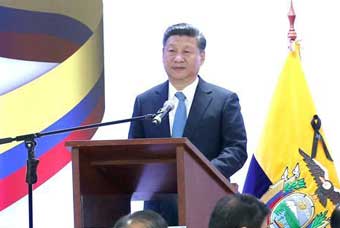BEIJING, Jan. 9 (Xinhua) -- Despite continued drops in China's foreign exchange (forex) reserves, economists believe there is no need to panic as reserves are still abundant for the country to fend off external risks.
Forex reserves fell for the sixth straight month to about 3.01 trillion U.S. dollars last month, down from 3.05 trillion dollars in November and 3.12 trillion dollars in October, according to the People's Bank of China (PBOC) , the central bank.
The reserves are considered ammunition for China to resist financial risks, such as sharp falls in its currency, the yuan. The country has accumulated enormous forex reserves through its trade surplus, which, at its peak of 3.99 trillion U.S. dollars in 2014, accounted for roughly a third of the world's total.
Now the slipping reserves, nearing the 3-trillion-USD psychological mark, have stoked market concerns as the country has stayed above the level for nearly six years.
But economists dismissed the worries, saying the downward trend is a normal phenomenon resulting from forex management by regulators, the country's ongoing economic opening, and increasing foreign currency purchases.
"There is no need to be overly sensitive to or panic over the 3-trillion-USD mark as it has little actual meaning," said Zhang Huanbo, deputy researcher of the China Center for International Economic Exchanges.
Echoing his words, China Merchants Securities' analyst Xie Yaxuan said, "I do not think it is a bottom line that cannot be breached."
The current reserves are sufficient for China to satisfy market liquidity demand and withstand risks as foreign trade continues to see a surplus, and outbound and inbound investment have generally maintained equilibrium, economists said.
Meanwhile, regulators called for the market to pay more attention to whether forex reserves can provide enough liquidity, rather than obsessing over a specific level.
"The forex reserves are abundant and within a reasonable and stable range, and falling below the 3-trillion-USD mark does not point to a crisis," said an anonymous official from the State Administration of Foreign Exchange (SAFE).
But given rising foreign currency purchase demands and lingering weakness of the yuan, downward pressure on China's forex reserves still looms.
Due to expectations of a stronger greenback and the U.S. Federal Reserve's rate hikes, the yuan's central parity rate softened 594 basis points to 6.9262 against the U.S. dollar on Monday, ending two-day jumps and the biggest daily decline since June.
Steven Zhang, an economist with Morgan Stanley Huaxin Securities, predicted the yuan will depreciate mildly against the U.S. dollar this year, while remaining stable against a basket of non-greenback currencies.
Under the circumstances, the PBOC will have to continue to deplete the reserves to stabilize the yuan and prevent capital outflows. SAFE has attributed China's 319.8-billion-USD reserve drop in 2016 partly to the PBOC's market operations.
The forex reserves are likely to drop below 3 trillion U.S. dollars in January, which will not change the fact that the reserves are still abundant, according to a report from China International Capital Corporation, a leading investment bank in China.
China is still home to the world's largest forex reserves and enjoys forex inflows from its trade surplus and foreign direct investment.
As part of the efforts to defend shrinking reserves, Chinese regulators have improved supervision over outbound investment and personal foreign exchange purchases, and cracked down on capital outflows via money laundering, underground banks and other illegal activities.
SAFE said Friday that it will strengthen management of cross-border capital flow and improve management of forex reserves to maintain safety and flexibility.














